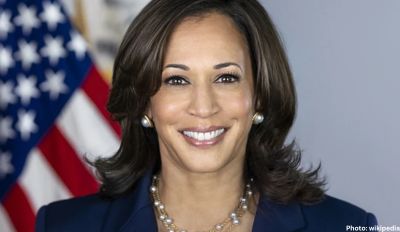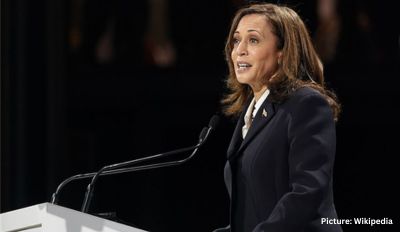The strong group of Progressives in the US House of Representatives, led by the lone Indian American Congresswoman wants assurances that the spending plan, is certain to be supported by the entire Democratic caucus both in the Senate and the House
On Friday, October 1st, after President Joe Biden met with the Democratic lawmakers on the Hill, Representative Pramila Jayapal, the chair of the Congressional Progressive Caucus (CPC), highlighted her group’s growing prominence and leverage in Capitol Hill politics: “In the House,” she said, “everybody is a Joe Manchin.”
 Progressives claimed victory after a planned infrastructure vote was delayed following their united front to oppose the $1 trillion bill without assurances about the fate of the accompanying Democratic spending plan last week. The move highlighted the growing power of leftwing Democrats, and sent a strong message to the rest of their party: You can’t get one bill without the other. West Virginia senator Manchin and his fellow holdout Kyrsten Sinema of Arizona might hold the cards in the 50-50 US Senate, but in the lower chamber at least the progressives were in the driving seat.
Progressives claimed victory after a planned infrastructure vote was delayed following their united front to oppose the $1 trillion bill without assurances about the fate of the accompanying Democratic spending plan last week. The move highlighted the growing power of leftwing Democrats, and sent a strong message to the rest of their party: You can’t get one bill without the other. West Virginia senator Manchin and his fellow holdout Kyrsten Sinema of Arizona might hold the cards in the 50-50 US Senate, but in the lower chamber at least the progressives were in the driving seat.
The strong group of Progressives in the US House of Representatives, led by the lone Indian American Congresswoman want assurances that the spending plan, which forms the core of Biden’s domestic policy agenda, includes ambitious spending on universal pre-K, childcare funding, tuition-free community college, home health care, and climate change prevention, is certain to be supported by the entire Democratic caucus both in the Senate and the House. Despite Democratic leadership’s attempts to push through the infrastructure bill alone, the Congressional Progressive Caucus (CPC) vowed to withhold their votes unless they got assurances about the larger spending bill.
For weeks, progressive lawmakers in Congress have been threatening to sink the bipartisan infrastructure bill if they were not given certain guarantees about a larger social spending bill. And for weeks, many of their colleagues thought they were bluffing. “The progressive movement has not had this type of power in Washington since the 1960s,” says Joseph Geevarghese, Executive Director of Our Revolution, a political group that grew out of Vermont Sen. Bernie Sanders’ first presidential campaign.
 The move illuminated how the newly powerful progressive movement can shape the way Biden’s agenda moves through Congress, with the power to delay or even block some moderate priorities. The progressive movement has been building in influence and organizing capacity since 2016, when Sanders’ insurgent presidential campaign breathed new life into the grassroots left. The progressive caucus has frequently threatened to withhold votes over ideological differences with more moderate Democrats, but usually failed to actually stop a major agenda item. Now, the once-fledgling progressive wing of the Democratic party has become a political force strong enough to resist the will of moderates and its own party’s leaders.
The move illuminated how the newly powerful progressive movement can shape the way Biden’s agenda moves through Congress, with the power to delay or even block some moderate priorities. The progressive movement has been building in influence and organizing capacity since 2016, when Sanders’ insurgent presidential campaign breathed new life into the grassroots left. The progressive caucus has frequently threatened to withhold votes over ideological differences with more moderate Democrats, but usually failed to actually stop a major agenda item. Now, the once-fledgling progressive wing of the Democratic party has become a political force strong enough to resist the will of moderates and its own party’s leaders.
The CPC is larger and stronger than ever before, emboldened by an organized network of leftwing organizations like Our Revolution that have been creating outside pressure on all lawmakers in the party. But CPC members were also in sync with the President, who supported the goal to pass the Build Back Better plan alongside the infrastructure bill. Aides to influential progressives said they had not been pressured by either House leadership or the White House to support infrastructure without the spending bill.
The fact that the progressive position is in line with Biden’s agenda strengthened the caucus’s resolve. That unity comes after a concerted effort by both sides during the 2020 Democratic primary to bridge the party’s internal divisions: Biden moved to the left on some issues like climate and childcare, while progressives accepted that he would never support Medicare for All. That hard-won alignment, progressives say, is why they’re fighting so hard to protect the President’s Build Back Better Plan, which includes ambitious spending on many of their longstanding policy goals. “This is not a progressive agenda. We are fighting for the ‘build back better’ agenda, which is the President’s agenda,” Rep. Ilhan Omar, the whip of the CPC, told reporters on Thursday.
Senate Democrats could, in theory, pass the bill without any Republican support due to a legislative loophole allowing them to advance budgetary issues with a simple majority. But garnering support from all 50 Democratic Senators depends in large part on the votes of the two most moderate Senate Democrats, Joe Manchin of West Virginia and Kyrsten Sinema of Arizona, both of whom have said that the $3.5 trillion spending framework is too high. Politico reported on Thursday that Manchin told Senate Majority Leader Chuck Schumer this summer he wouldn’t support a reconciliation bill exceeding $1.5 trillion—news that could mean that Democrats have to shave roughly $2 trillion in spending from the existing package.
Acknowledging that her party held the House by only a small margin, Jayapal noted that every member wielded make-or-break powers. And by flexing their muscles and forcing House speaker Nancy Pelosi to push back a planned vote on the trillion-dollar infrastructure bill, the group was signaling it was no longer on the fringe of the Democratic caucus, but front and center, guiding its direction.
Jayapal, who was born in India and immigrated to the US four decades ago at the age of 16, has been a key architect in the rise of the progressives during Biden’s presidency. The unofficial coach to the so-called “Squad” of neoteric young women elected to Congress in 2018, including its most prominent members Alexandria Ocasio-Cortez and Ilhan Omar, she has spent much of the summer defending the administration’s ambitious infrastructure and social agendas.
At the same time she made it clear that the 96-member CPC would hold firm in the face of pressure from Manchin and other Senate and House moderates to reduce the price tag of the agenda, as proved when Thursday’s vote was delayed. It is that tenacity that has helped her emerge as a key player in the infrastructure and $3.5tn social package negotiations, and by extension an influential figure in the future successes or failures of Biden’s wider manifesto.
She said on Friday she had been in almost constant contact with the White House and Democratic congressional leaders. “We are making sure we’re holding up the women who need childcare, the families who need childcare, unpaid leave, the folks who need climate change addressed, housing, immigration,” she told reporters.
The congresswoman released the following statement following her meeting with President Joe Biden at the White House last week: “I want to thank President Biden for inviting us to the White House and for continuing to fight for his visionary Build Back Better agenda that people throughout this country want, need, and deserve. We had a very productive and necessary conversation about the urgent need to deliver long-overdue investments — not only in roads and bridges, but also in child care, paid leave, health care, climate action, affordable housing, and education.
“As I did yesterday with Speaker Pelosi, I reiterated what I have consistently said: progressives will vote for both bills because we proudly support the President’s entire Build Back Better package, but that a majority of our 96-member caucus will only vote for the small infrastructure bill after the Build Back Better Act passes. This is the President’s agenda, this is the Democratic agenda, and this is what we promised voters when they delivered us the House, the Senate, and the White House. We agree with President Biden that, ‘We can do this. We have to do this. We will do this.’ We remain strongly committed to continuing these discussions so we are able to deliver these two important bills to his desk.”
Jayapal’s supporters credit her communication skills combined with a hard-nosed determination for maneuvering her caucus into its new authoritative role. She told reporters last week that her message for anybody doubting that the group would block the infrastructure bill unless the social package passed was: “Try us.”
“Pramila has turned the CPC into a strong political force by keeping everyone informed, having people talk through the issues and then make real commitments,” the Massachusetts senator and fellow progressive Elizabeth Warren told the New Republic. “That force is now being felt when the leadership promised that all the pieces would move together. The CPC is holding that leadership accountable.”
“There’s sometimes frustration, but we’re all part of the Democratic party, this is the Democratic agenda, it’s the president’s agenda and we’re excited to be fighting for the same thing. I’ve been here four and a half years. I still find it strange, but things only happen here when there’s urgency and some reason for people to be at the table. We’ve seen more progress in the last 48 hours than we have seen in a long time.”










